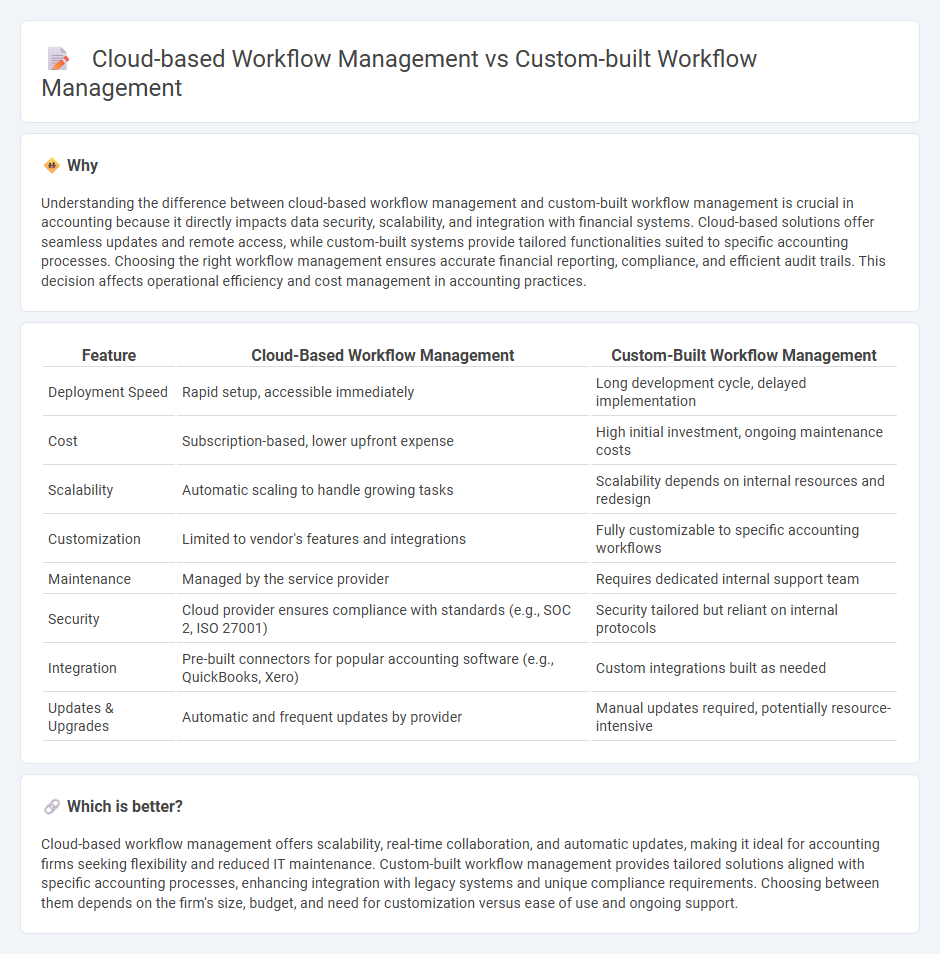
Cloud-based workflow management offers scalable, accessible solutions with automatic updates and real-time collaboration, ideal for accounting firms seeking efficiency without heavy IT investments. Custom-built workflow management provides tailored features and integration specific to unique accounting processes but may require significant upfront costs and ongoing maintenance. Explore the advantages and challenges of both approaches to determine the optimal workflow management solution for your accounting practice.
Why it is important
Understanding the difference between cloud-based workflow management and custom-built workflow management is crucial in accounting because it directly impacts data security, scalability, and integration with financial systems. Cloud-based solutions offer seamless updates and remote access, while custom-built systems provide tailored functionalities suited to specific accounting processes. Choosing the right workflow management ensures accurate financial reporting, compliance, and efficient audit trails. This decision affects operational efficiency and cost management in accounting practices.
Comparison Table
| Feature | Cloud-Based Workflow Management | Custom-Built Workflow Management |
|---|---|---|
| Deployment Speed | Rapid setup, accessible immediately | Long development cycle, delayed implementation |
| Cost | Subscription-based, lower upfront expense | High initial investment, ongoing maintenance costs |
| Scalability | Automatic scaling to handle growing tasks | Scalability depends on internal resources and redesign |
| Customization | Limited to vendor's features and integrations | Fully customizable to specific accounting workflows |
| Maintenance | Managed by the service provider | Requires dedicated internal support team |
| Security | Cloud provider ensures compliance with standards (e.g., SOC 2, ISO 27001) | Security tailored but reliant on internal protocols |
| Integration | Pre-built connectors for popular accounting software (e.g., QuickBooks, Xero) | Custom integrations built as needed |
| Updates & Upgrades | Automatic and frequent updates by provider | Manual updates required, potentially resource-intensive |
Which is better?
Cloud-based workflow management offers scalability, real-time collaboration, and automatic updates, making it ideal for accounting firms seeking flexibility and reduced IT maintenance. Custom-built workflow management provides tailored solutions aligned with specific accounting processes, enhancing integration with legacy systems and unique compliance requirements. Choosing between them depends on the firm's size, budget, and need for customization versus ease of use and ongoing support.
Connection
Cloud-based workflow management and custom-built workflow management are interconnected through their shared goal of streamlining accounting processes by automating task sequencing and enhancing real-time collaboration among finance teams. Cloud-based systems enable scalable, remote access to tailored workflows designed to accommodate unique accounting practices, reducing manual errors and increasing efficiency. Integration of custom-built workflows within cloud platforms allows seamless data synchronization, improving accuracy in financial reporting and compliance management.
Key Terms
Cost Structure
Custom-built workflow management systems often require significant upfront investment in development, hardware, and ongoing maintenance, resulting in higher fixed costs. Cloud-based workflow management solutions typically operate on a subscription or pay-as-you-go model, offering scalable and predictable operational expenses with minimal initial outlay. Explore further to understand which cost structure aligns best with your organization's financial and operational goals.
Data Security
Custom-built workflow management systems offer superior data security by enabling organizations to maintain full control over their infrastructure, ensuring sensitive information remains on-premise and adheres strictly to their security protocols. Cloud-based workflow management often relies on third-party providers, which may introduce vulnerabilities due to shared resources and external access points, despite offering encryption and compliance certifications. Explore more to understand how each approach impacts your organization's data protection strategy.
Scalability
Custom-built workflow management systems offer tailored scalability, allowing businesses to design infrastructure and processes specifically aligned with their growth projections and operational complexity. Cloud-based workflow management platforms provide elastic scalability by leveraging distributed cloud resources, enabling automatic adjustment to changing workloads without the need for significant upfront investment. Explore detailed comparisons to understand which scalability approach best suits your organization's long-term needs.
Source and External Links
25 Best Workflow Management Tools In 2025 - Cflow is a cloud BPM workflow automation platform offering fully customizable, no-code process workflows with drag-and-drop tools, enabling businesses to automate key workflows quickly and integrate with over 1000 apps for robust custom solutions.
Enterprise Workflow Automation Software - HighGear provides a no-code workflow management platform tailored for business users to design, automate, and manage custom workflows with role-based permissions, automatic notifications, and easy scalability to meet complex business needs without IT assistance.
Custom-made Workflow Software for a Rare Breed of Businesses - Kissflow offers custom-built workflow software that integrates legacy systems and supports real-time collaboration, allowing businesses with complex, specialized processes to tailor workflows deeply integrated with core operations and other enterprise software like CRM or ERP.
 dowidth.com
dowidth.com